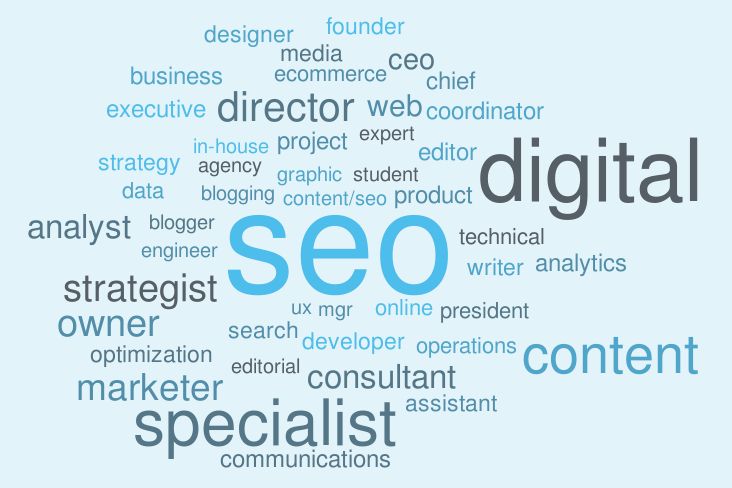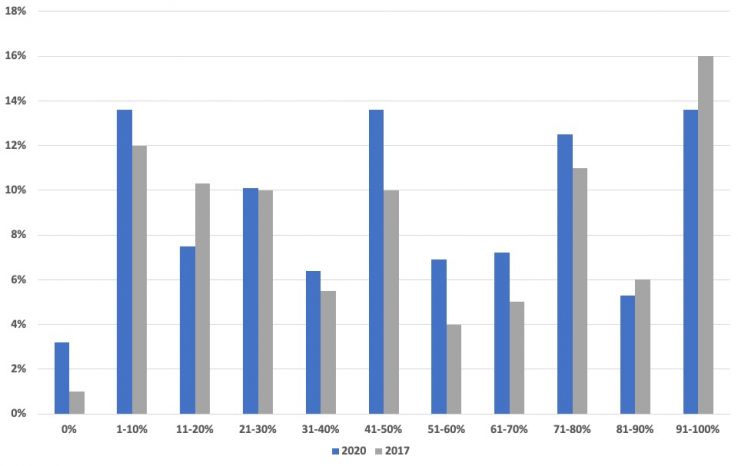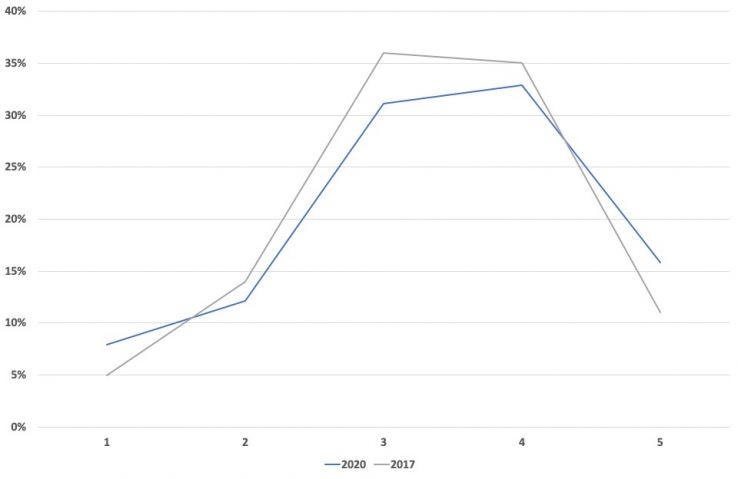Posted by morgan.mcmurray
You’re tired of hearing it and I’m tired of saying it, but 2020 really has been a year like no other. SEOs and marketers around the world had to deal with their day-to-day work moving home, alongside a host of natural disasters, civil rights issues, and a pandemic that will alter our industry and global economy for years to come.
We could have held off on launching this year’s reader survey, but we decided to move forward anyway because we know your work and your interests have been impacted, and we wanted to know how much.
I’m excited to share with you the results from that survey in this post. We’ll go through what’s changed — and what hasn’t — for our readership since our last survey in 2017, and detail what those insights mean for the Moz Blog in 2021.
Methodology
We published this survey in July 2020, with questions asking for details on the professional occupations of our readers, how those readers interact with the blog, and what those readers like to see from the blog. We also included COVID-19-specific questions to gauge the pandemic’s impact on our readers. The survey was shared on the blog, through email blasts, and on our social media accounts.
The percentages shared in the sections below are part of a total of 388 responses we received over four months. This is actually our first data point, showing that engagement with surveys has shifted drastically since our 2017 survey, which got nearly 600 responses in just one month. Given the interruptive nature of 2020’s events, we won’t let that difference discourage us from utilizing surveys in the future. Where able, I’ve compared 2020’s results to those of the 2017 survey, to better visualize the differences.
Answers were not required for all questions, so if something did not apply to a respondent, they could leave the answer blank or choose a variety of “no opinion” or “N/A” options.
We don’t typically include demographic or geographic questions in our reader surveys, but given the overwhelmingly positive response to the Gender Gap in SEO and Diversity and Inclusion in SEO surveys published this year, we will do so moving forward. Understanding the struggles SEOs and marketers face in the industry due to race, gender, and sexual orientation is imperative to understanding how to best work with and for everyone, and we acknowledge that shortcoming in this year’s survey.
Who our readers are
Let’s dive in. First up: the questions asking readers to tell us more about themselves.
What is your job title?
The word cloud below is an amalgamation of the top-used words in response to this question, and the size of the word correlates to the number of mentions that word received.
No surprises here: number one (by far) was “SEO”. Our readership remains heavily SEO-focused in their occupations, with content marketers coming in close second.

What percentage of your day-to-day work involves SEO?
That said, 2020 saw an increase in respondents in the lower percentage brackets of readers who use SEO strategies in their daily work, specifically the 1-10% and 41-50% ranges. This could be due, in part, to the broadening of tasks assigned to SEOs in the marketing industry, as several respondents also mentioned a need to wear multiple hats in their organization.

On a scale of 1-5, how advanced would you say your SEO knowledge is?
The majority of our readers remain intermediately knowledgeable about SEO concepts, leaving plenty of room for new learnings across skill levels.

Do you work in-house, or at an agency/consultancy?
While the majority of Moz Blog readers are still in-house SEOs and marketers, an interesting takeaway for us in 2020 is the increase of those who are independent consultants or freelancers from 11% in 2017 to just under 17% in 2020. We’ll make sure to take that into account for our content strategy moving forward.

What are some of the biggest challenges you face in your work today?
Far and away, the challenge most often mentioned in response to this question was the high volume and rapid cadence of new SEO information, new tools, and algorithm updates. Readers are struggling to determine what to focus on and when, what to prioritize, and what even applies to their work. We can certainly help you with that in 2021.
Other frequently-mentioned struggles were familiar to us from previous surveys, showing us that the SEO industry still needs to address these issues, and that the Moz Blog can continue offering up content in response. These issues included:
- Lack of resources and cross-functional collaboration at work.
- SEO prioritization at work.
- Lack of consolidation in analytics and reporting tools.
- Difficulty explaining the value of SEO to bosses/clients/non-SEOs.
- Difficulty explaining what SEO CAN’T do to bosses/clients/non-SEOs.
- Attracting new clients and customers.
- Having to wear multiple hats.
How our readers read
Keeping in mind all that context of who our readers are, we dug into preferences in terms of formats, frequency, and subject matter on the blog.
How often do you read posts on the Moz Blog?
As an increasing number of readers rely on social media channels for their news and content consumption, the shift from frequent readers to “every once in a while” readers is not a surprise, but it is a concern. It also necessitates our incorporation of social media engagement as a top KPI for blog performance.
Given the multiple off-blog distribution methods and frequency of prompts to take this year’s survey, we saw a sharp increase in “non-reader” responses from 1% in 2017 to 6% in 2020. That said, it’s interesting that Moz email and social media subscribers who weren’t Moz Blog readers felt motivated to take a survey entitled “Moz Blog Reader Survey”. We’ve taken note of the topics requested from those respondents, in the hopes of encouraging more engagement with the blog.

On which types of devices do you prefer to read blog posts?
While desktop and laptop computers remain the most common way to consume blog content, mobile phone use saw an increase of nearly 10 percentage points. Mobile phones have only improved in the last three years, and it’s no secret that we’re using them more often for actions we’d normally take on a computer. As we move toward blog CMS improvements in 2021, mobile-friendliness will be a priority.

Which other site(s), if any, do you regularly visit for information or education on SEO?
Across the board, we saw a decrease in the number of respondents listing other SEO news resources, as well as the first instance of a social media platform in the top 10 resources mentioned. This only serves as further evidence that social media is continuing its growth as a news and content medium.

What our readers think of the blog
Here’s where we get into more specific feedback about the Moz Blog, including whether it’s relevant, how easy it is for readers to consume, and more.
What percentage of the posts on the Moz Blog would you say are relevant to you and your work?
While the trends regarding readers’ opinions on relevancy remained similar between 2017 and 2020, we saw about a 6% dip in respondents who said 81-90% of posts are relevant to them, and increases in the bottom four percentage brackets. These results, paired with the topic requests we’ll cover later, indicate a need to shift and slightly narrow our content strategy to include more posts specific to core SEO disciplines, like on-page SEO and analytics.

Do you feel the Moz Blog posts are generally too basic, too advanced, or about right?
Given the breadth of topics on the blog and the wide range of reader skill levels, we’re happy to see that, for the most part, readers find our posts just about right on a scale of too easy to too advanced.

In general, what do you think about the length of Moz Blog posts?
Similarly, it’s great to see that readers continue to be satisfied with the amount of content served up in each post.

How often do you comment on blog posts?
RIP, comment section. A trend we’ve seen over the last several years continues its downward slope: 82% of readers who took part in the survey never comment on posts.

When asked for the reasons why they never comment, we saw some frequent responses:
- “I have nothing to add.”
- “It wouldn’t add value.”
- “I’m still learning.”
- “I never comment anywhere.”
- “I don’t have enough time.”
- “Follow-up questions go unanswered.”
- “I read posts in the RSS feed.”
- “English isn’t my first language.”
- “I’m not signed in.”
Blog comment sections and forums used to be the place for online conversations, so this drop in engagement certainly signals the end of an era. However, these concerns also give us some areas of improvement, like working with our authors to be more responsive and improving comment accessibility. But sorry to those who prefer not to sign in — without that gate, we’d be inundated with spam.
In contrast, here were the reasons for commenting:
- “I have a question.”
- “I have a strong emotional connection to the material.”
- “I strongly agree or disagree.”
- “I want to add my personal experience or advice.”
We definitely encourage readers who do have questions or concerns to continue commenting!
What, if anything, would you like to see different about the Moz Blog?
Outside the responses along the lines of “No changes! Keep up the good work!” for which we thank you, these were the top asks from readers:
- More thoughtful feedback from and interaction with authors.
- More variety and diversity in our author pool.
- More video content.
- More specific case studies, tests, and experiments.
- More step-by-step guides with actionable insights showing how to solve problems.
- Ability to filter or categorize by skill level.
- Diversity in location (outside the US).
These are great suggestions, some of which we’ve already begun to address!
We also received only a few responses along the lines of “keep your politics out of SEO”, specifically referencing our Black Lives Matter support and our posts on diversity. To those concerned, I will reiterate: human rights exist beyond politics. Our understanding of the experiences our co-workers and clients have had is essential to doing good, empathetic work with and for them. The Moz Blog will continue our practice of the Moz TAGFEE code in response to these ongoing issues.
What our readers want to see
Which of the following topics would you like to learn more about?
Survey respondents could choose multiple topics from the list below in their answers, and the most-requested topics look very similar to 2017. A noticeable shift is in the desire for mobile SEO content, which dropped from being requested in 33% of responses in 2017 to just under 20% in 2020.
In 2020, we certainly had more content addressing the broader marketing industry and local SEOs impacted by the pandemic. To better address the relevancy issue mentioned earlier, the top four core SEO subjects of on-page SEO, keyword research, link building, and analytics (all included in over 50% of responses) will become blog priorities in 2021.

Which of the following types of posts would you most like to see on the Moz Blog?
The way readers want to consume those topics hasn’t changed much at all in the last three years — the desire for actionable, tactical insights is as strong as ever, with the request for tools, tips, and techniques remaining at 80% of respondents. These types of posts have been and will remain our go-to moving forward.

COVID-19
Moving into our last and newest section for the survey, we asked readers questions regarding the way in which they consume SEO-related content during the COVID-19 era.
Has your consumption of SEO-related content changed due to COVID-19?
Only 34% of respondents said that their consumption of SEO-related content had changed as a result of the pandemic, a number we expected to be higher. It’s encouraging to see that so many readers were able to maintain a sense of normalcy in this area.

Of those who did see a shift, these were the most common reasons why:
- Job loss and job hunting
- Shift to work from home and being online 24-7
- E-Commerce industry shifts
- Online engagement shifts and ranking and traffic drops
- Loss of clients and constricting budgets
- More time to read paired with less time or opportunity to implement learnings
Would any of the following topics be helpful for you as a result of COVID-19 impacts?
Along those same lines, the most popular topic requested as a result of COVID-19 impacts with 27% of responses was tracking/reporting on traffic and ranking drops. Content and marketing strategies during a crisis came in close second and third, with 24% and 21%, respectively.

The answers to these questions show us that pivoting our content strategy in spring 2020 to address areas of concern was helpful for about a third of our readers, and probably contributed to the relevancy issue for the other two-thirds. We’ll continue to include these topics (on a smaller scale) until we see the other side of this crisis.
What happens next?
Primary takeaways
You asked, and we hear you. Moving into 2021, we’ll be writing on more technical, core SEO topics along with issues on the business side of SEO. We’ll also be building out our Whiteboard Friday series to provide more fresh video content. And as always, we’ll strive to provide you with actionable insights to apply to your daily work.
Given the steep decline in comment section engagement, we’ll be encouraging our authors to be more responsive to questions, and to interact with you on social media. Make sure to follow Moz on Twitter, Instagram, Facebook, and LinkedIn to stay up-to-date with the blog and our guest authors.
Finally, stay tuned, as next year we’re planning UX improvements to our blog CMS to address usability and accessibility concerns.
My genuine thanks goes out to those readers who took the time to give us their feedback. It is immeasurably valuable to us, and we’re looking forward to applying it to all the amazing content we have coming your way in 2021.
Have a safe and healthy holiday season, Moz fans, and happy reading!
Sign up for The Moz Top 10, a semimonthly mailer updating you on the top ten hottest pieces of SEO news, tips, and rad links uncovered by the Moz team. Think of it as your exclusive digest of stuff you don’t have time to hunt down but want to read!
![]()